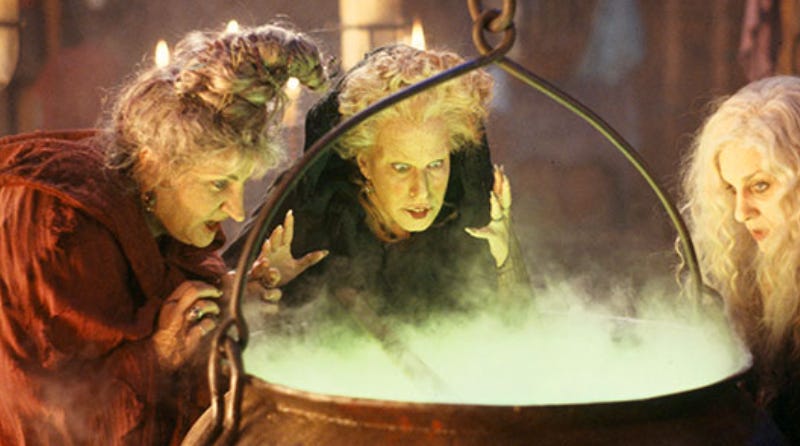a watched pot never boils
my first, and favorite, kitchen idiom
I remember watching Hocus Pocus with my older cousins one Halloween in the boonies of South Kalamazoo County. We weren’t dressed to trick-or-treat, but we were feeling festive and needed a Disney-level scare. The classic tale follows three witches who are reincarnated on Halloween night and are trying to find a way to stay immortal. They hatch a plan to harness the life essence of the children in Salem, Massachusetts.
Despite the spooky trio of witches (who are also sisters) looking to take down the poor kids of a small coastal town known for its anti-witch stance, the movie has some good comic relief. In one scene, as they’re cooking one of their immortality tonics in a big bubbling pot, one of the sisters laments how long it’s taking to heat up. The other replies, “A watched cauldron never boils.”
At the time, I was young enough to believe that if you actually watched a cauldron, it would never boil; keeping us kids safe from any potions being made. Turns out, boiling water isn’t the culinary equivalent of the double-slit experiment; it will boil when observed. But this was a Halloween-coded version of “a watched pot never boils,” which I wanted to break down today.
The first use of the phrase is typically attributed to Benjamin Franklin, but it’s likely been used since we had vessels to heat water for cooking. As you’d imagine, it was never meant to be taken literally, as I had as a young boy. Instead, it seems to be a universal truth among those who cook: time seems to move slower the more focused we are on a certain event happening. This extends far beyond the kitchen: waiting on a delivery, anticipating an email, or any other high-anxiety timing apparatus we’ve built for ourselves.
Maybe we don’t think about this idiom much anymore because we’re always watching some kind of pot. Our phones, our inboxes, our timelines all demand constant attention while real time slips by. Cooking asks for something different. It gives us pauses on purpose: water that takes time to boil, dough that needs to rise, flavors that need to meld. That waiting is a built-in chance to prepare, to chop, to plan.
The witches of Hocus Pocus had it half right. A watched cauldron does boil, just not any faster. The trick isn’t in staring at it; it’s in using the wait well. Maybe patience hasn’t disappeared, it’s just been misplaced. The boil is inevitable. What matters is what we do before it happens.


